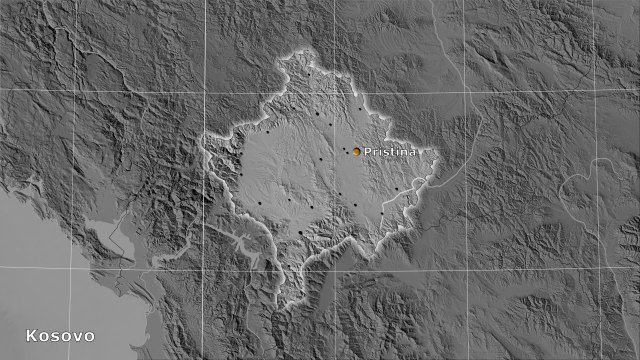
EU Special Representative Miroslav Lajcak is expected to agree on a Belgrade-Pristina dialogue framework by the end of the month
SOURCE: TANJUG THURSDAY, JUNE 11, 2020 | 16:44
It is expected to harmonize the principles, the topics of negotiations on the normalization of relations between the two sides, in order to reach a final solution which, as it is estimated, will largely depend on Germany.
What can be expected in the next period, which the President of Serbia Aleksandar Vucic assessed as "a difficult six months to a year of hard struggle" for the interests of the Serbian people in Kosovo and Metohija, and which coincides with the German EU presidency on July 1 this year, should be perceived in accordance with the public knowledge that without the "green light" from Berlin no issue in the framework of all European policies can be resolved, including the issue of relations between Belgrade and Pristina. Thus, although they emphasize in Brussels that Belgrade and Pristina should agree on what will be discussed at the table in Brussels, Lajcak has already ruled out the possibility of talks on the border, which is interpreted in diplomatic circles as logical, given that He sees Lajcak as a person "close to Berlin" and the German position on the solution to the "Kosovo knot". European diplomats point out that "no solution will be possible without the consensus of Berlin, Paris and Washington", but the latest developments indicate a visible divergence between the policies of Berlin and Washington, not only when it comes to Kosovo, but also in many globally strategic areas.
Tense relations on the line of Merkel - Trump, but also Trump - Brussels, are most visible in the attitude of the former US Ambassador to Germany Richard Grenell, when German political circles openly criticized and accused him of "aggressive and almost hostile attitude towards the German government and official Brussels."
"A European solution to the European problem"
The German Bundestag called Grenell, even before he took over the issue of Kosovo on behalf of President Trump with the goal to resolve it, as it is interpreted, at any cost (even at the cost of changing borders), called "persona non grata" and "complete diplomatic failure”.
In its recognizable "diplomatic way", the EU assessed the role of Grenell and the USA in resolving the Kosovo issue as "partner's help", but also made it increasingly clear that "it is in the hands of the EU to conduct a dialogue between Belgrade and Pristina" because a European solution is needed for the European problem”.
The foreign ministers of Germany and France, Heiko Maas and Jean-Yves le Drian, recently sent a joint message to Belgrade and Pristina that the dialogue must continue "under the leadership of the EU", emphasizing that it is about "stability and security of the entire region and the EU."
Macron also got involved
These days, the President of France, Emmanuel Macron, is writing to the new Prime Minister of Kosovo, Avdullah Hoti, that he is ready to organize a summit in Paris on the topic of the Kosovo dialogue, as a continuation of the Berlin Summit of leaders from April 2019.
But the joint initiative of Germany and France to initiate and return the dialogue between Belgrade and Pristina into the hands of Europe "where it belongs geographically, interestingly and according to the UN mandate" does not mean that Paris unreservedly supports Berlin's position on the final solution of the dialogue.
Diplomatic sources in Brussels state that France was not among the group of countries that, behind the meeting with Special Representative Miroslav Lajcak, stood behind the idea of "keeping borders intact at any cost".
"France wants to support the continuation of the dialogue, but does not comment specifically on the final solution," said sources from the meeting between the EU ambassador and the special representative.
Germany regards Western Balkans a priority
Berlin, whose initial plan for the EU presidency was to focus on the sexual and political issue of the Western Balkans, now says that Germany's goal is the socio-economic renewal of the EU and lifting the Union from the biggest crisis since its inception".
But in circles close to the Brussels dialogue, they agree that Germany, as they say, has the capacity to maintain focus and, more importantly, to provide political support for finalizing the dialogue on more comprehensive normalization of relations between Belgrade and Pristina in the coming months, as the interest in the Western Balkans is not subject to "shakes and changes".
During Tadic's reign, EU membership was conditioned by Kosovo and Metohija for the first time
The original framework and goals of the dialogue between Belgrade and Pristina were set back in 2011, when German Chancellor Angela Merkel, in talks with then-Serbian President Boris Tadic, set four criteria that define the framework and future outcome of the dialogue.
Thus, for the first time, Serbia's membership in the EU is conditioned by the acceptance of Kosovo's independence and the transformation of relations between Serbia and Kosovo into bilateral ones.
Shortly before Merkel's visit to Belgrade, the then head of German diplomacy Guido Westerwelle said that "Germany will not negotiate on the territorial integrity of the countries in the region" and thus hinted that the division of Kosovo could not be a topic. Germany, as undoubtedly the most important EU member state when it comes to enlargement and the Western Balkans, has never changed its position on the Kosovo issue.
No comments:
Post a Comment